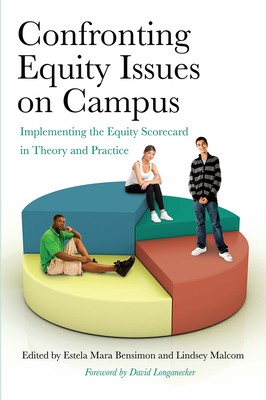
- We will send in 10–14 business days.
- Publisher: Stylus Publishing (VA)
- ISBN-10: 1579227082
- ISBN-13: 9781579227081
- Format: 15.2 x 22.6 x 2.3 cm, softcover
- Language: English
- SAVE -10% with code: EXTRA
Confronting Equity Issues on Campus (e-book) (used book) | bookbook.eu
Reviews
Description
How can it be that 50 years after the passage of the Civil Rights Act, our institutions of higher education have still not found ways of reducing the education gaps for racial and ethnic groups?
That is the question that informs and animates the Equity Scorecard model of organizational change. It shifts institutions' focus from what students do (or fail to do) to what institutions can do--through their practices and structures, as well as the actions of their leaders and faculty--to produce equity in outcomes for racially marginalized populations. Drawing on organizational learning theory and the methods of action research, it creates a structure for practitioners to become investigators of their own institutional culture, to become aware of racial disparities, confront their own practices and learn how things are done on their own turf to ask: In what ways are my practices contributing to equity/inequity?
The Equity Scorecard model differs significantly from traditional approaches to effecting change by creating institutional teams to examine and discuss internal data about student outcomes, disaggregated by race and ethnicity. The premise of the project is that institutional data acts as a powerful trigger for group learning about inequities in educational outcomes, and that the likelihood of improving those outcomes increases if the focus is on those things within the immediate control of the participating leaders and practitioners.
Numerous institutions have successfully used The Equity Scorecard's data tools and processes of self-reflection to uncover and document the behaviors and structures that lead to failure to retain and graduate students from diverse racial and ethnic backgrounds with a history of unequal opportunity; and to create the climate for faculty and staff to take ownership of the issues and develop sustainable practices to eliminate racial disparities in academic performance.
The Scorecard can be used at a small-scale to analyze indi
EXTRA 10 % discount with code: EXTRA
The promotion ends in 18d.08:44:18
The discount code is valid when purchasing from 10 €. Discounts do not stack.
- Publisher: Stylus Publishing (VA)
- ISBN-10: 1579227082
- ISBN-13: 9781579227081
- Format: 15.2 x 22.6 x 2.3 cm, softcover
- Language: English English
How can it be that 50 years after the passage of the Civil Rights Act, our institutions of higher education have still not found ways of reducing the education gaps for racial and ethnic groups?
That is the question that informs and animates the Equity Scorecard model of organizational change. It shifts institutions' focus from what students do (or fail to do) to what institutions can do--through their practices and structures, as well as the actions of their leaders and faculty--to produce equity in outcomes for racially marginalized populations. Drawing on organizational learning theory and the methods of action research, it creates a structure for practitioners to become investigators of their own institutional culture, to become aware of racial disparities, confront their own practices and learn how things are done on their own turf to ask: In what ways are my practices contributing to equity/inequity?
The Equity Scorecard model differs significantly from traditional approaches to effecting change by creating institutional teams to examine and discuss internal data about student outcomes, disaggregated by race and ethnicity. The premise of the project is that institutional data acts as a powerful trigger for group learning about inequities in educational outcomes, and that the likelihood of improving those outcomes increases if the focus is on those things within the immediate control of the participating leaders and practitioners.
Numerous institutions have successfully used The Equity Scorecard's data tools and processes of self-reflection to uncover and document the behaviors and structures that lead to failure to retain and graduate students from diverse racial and ethnic backgrounds with a history of unequal opportunity; and to create the climate for faculty and staff to take ownership of the issues and develop sustainable practices to eliminate racial disparities in academic performance.
The Scorecard can be used at a small-scale to analyze indi


Reviews